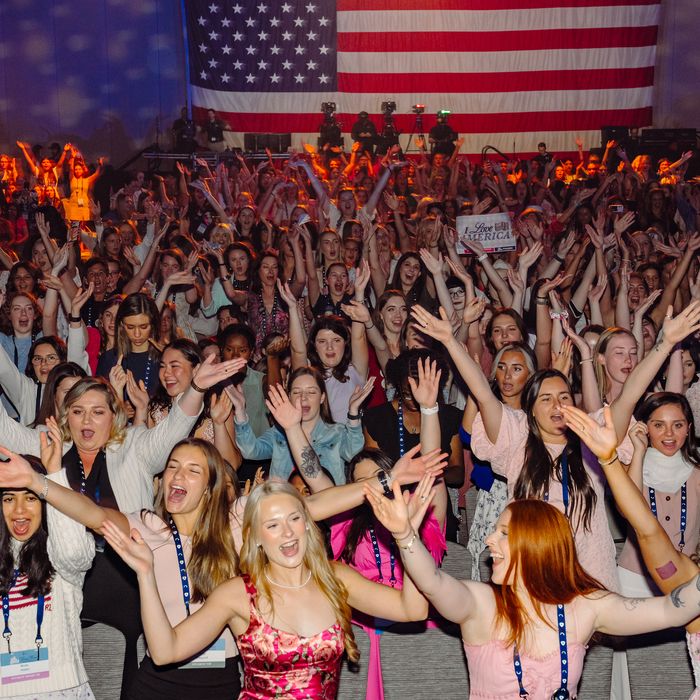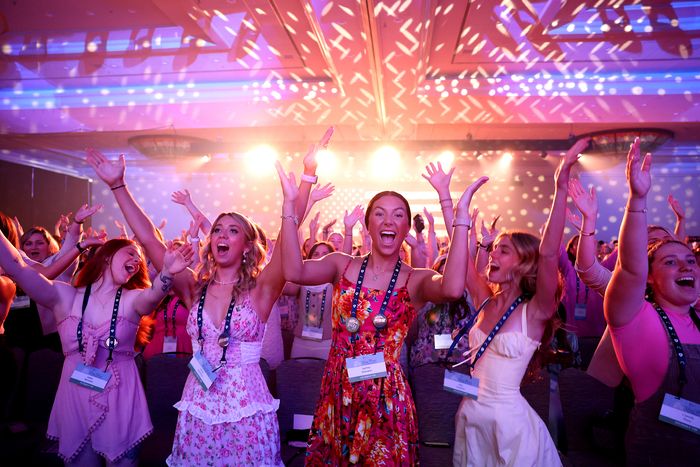
Hundreds of young women in floral sundresses and cowboy boots are line-dancing on the floor of a ballroom in a Dallas convention center. The bows and barrettes in their hair bob as they clap, stomp, twirl, and shimmy to the Christian hip-hop song “Church Clap” by KB featuring Lecrae. The many young mothers in the audience bounce their newborns on their hips and mouth the lyrics. “Do liberals do this?” asks the woman seated next to me, a flaxen-haired accountant from Kansas City dressed in Jackie Kennedy tweed. I have to concede that usually they do not, unless copious amounts of alcohol and/or ketamine are involved. I hate how much I’m enjoying this. I also hate how much I want a pair of bedazzled white cowboy boots.
This is my introduction to the Young Women’s Leadership Summit, an annual conference for young women who are involved in Turning Point USA, the Charlie Kirk–founded student conservative group. Now in its tenth year, the summit attracts thousands of women from across the country, most of whom are in their teens and early 20s. They lined up for selfies in front of a mirror printed with the slogan, “You look stunning, now go out there and save America”; shoveled down açai bowls at the concessions booth; and chatted about guys they hoped to see at the upcoming co-ed Student Action Summit in Tampa. They roamed the halls wearing buttons that said “Dump Your Socialist Boyfriend,” “My Favorite Season Is the Fall of Feminism,” and “I don’t need a degree to succeed.” The vibe of the entire weekend was like a sorority mixer, albeit with fewer kamikazes and more references to the Book of Ruth.
“Let’s just be honest: It’s never been hotter to be a conservative,” Alex Clark, the 32-year-old host of the popular wellness podcast Culture Apothecary, said in her opening remarks. “The left, they’ve got Tiktok activists with five shades of autism, panic attacks, and a ring light. We’ve got girls who look like they just walked off the cover of Vogue and can deadlift more than Harry Sisson,” the leftist TikToker. The crowd erupted into peals of laughter and applause.
Though a majority of women between the ages of 18 and 29 voted for Kamala Harris during the 2024 election, support for Trump grew by seven points among that same group compared to 2020. That number pales in comparison to the share of Gen-Z men who swung toward Trump — 58 percent, according to one poll — but the right is quick to tout it as evidence of mainstream culture shifting in their direction. “Conservatism is selling sexy in all aspects,” Clark told me after her speech. “Even the branding for President Trump’s campaign is so aesthetic and so genius and brilliant. The Make America Great Again hat is going to be a pure Americana staple forever. We are pop culture now.”
But the more time I spent in that ballroom, the more obvious it became that conservatism’s appeal to the young women gathered inside had little to do with Trump himself. Few young women I spoke to mentioned him by name; some even said they disliked him. The number of bedazzled cowboy hats and pastel bows in the audience far eclipsed the number of MAGA caps. Instead, the women seemed to be drawn to the speakers’ soft-focus brand of femininity. “The left wants women to feel angry and like victims, and like your rights are being taken away,” Arynne Wexler, a 31-year-old influencer, told me. “Whereas we think women are beautiful and serve a great purpose, and we elevate them in our own right.” In this world, instead of a machine to rage against, there was a vision of “more babies and beef tallow, less blue hair and birth control,” as Clark put it in her speech. An attendee could leave that talk and wander over to the merch tables to buy We Heart Nutrition omega-3 supplements (“10 percent of your purchase goes to pro-life pregnancy centers!” a sign next to them read), “MAHA red” lip glosses, and $70 pastel crewneck sweaters that read, “Healing a sick culture physically, emotionally, and spirituality.”
Many of the young women I spoke with were repeat YWLS attendees, but a few were first-time guests or newly minted conservatives who, emboldened by Trump’s victory, wanted to connect with like-minded young women their age. “At the tail end of the election, there was all this messaging to Gen Z that made conservative culture look cool,” Alexis Wilkins, a 26-year-old country artist who sang the national anthem to open the conference, said. “It came out how we’re not these stuffy, crazy people that don’t want to have a good time and are sitting in a corner, hating everyone.” Many of the women told me they were excited to see Clark or Brett Cooper, a 23-year-old podcaster who has more than 1.7 million followers on her YouTube channel (that’s a few hundred thousand more than Call Her Daddy). “Even my friends who are not political know who Brett Cooper is,” Shelby Gwinn, a 17-year-old from Atlanta who came to the conference with her mom, told me. “She’s really brought a lot of people in.”
Cooper told me that when she started at the Daily Wire, the conservative website co-founded by Ben Shapiro, her audience was only 10 percent female. “The right-wing media landscape was very male-dominated and there were very few Gen-Z voices — and most were men,” she says. Now, her audience skews 60 to 65 percent female. “I knew that I wanted to reach common-sense, right-leaning young women who, like me, had felt alienated and like they didn’t really have a place in this media landscape,” she said. “And over time, it happened.”
According to a spokesperson for the organization, this year’s summit was the most attended in Turning Point’s ten-year history, with more than 3,000 women at the event. There was a general sense of giddiness that the “tent is getting bigger,” according to Wexler, and that more young women were being brought into the fold.
Some first-time attendees told me they had been radicalized by the pandemic, with its mask mandates, lockdowns, and what they saw as arbitrary social-distancing restrictions. “The COVID situation really turned me off,” Emma Smith, a 21-year-old college student and self-described former die-hard liberal, told me, citing what she viewed as the left having “forced” vaccinations on people. For others, it was transgender athletes in women’s sports that pushed them right. “I want to protect female athletes,” Catarina Dicosmo, an Oakland University chapter leader for the right-wing campus group Network for Enlightened Women, said. It did not appear to matter that transgender women make up less than .002 percent of athletes at the college level; most of these women said they had never met a transgender person before.
Overall, the young women I spoke with were less animated by any specific social issue and more by frustration with the vision they felt liberal millennials offered them: that brand of Lean In–inspired girlboss feminism that suggests modern women can deftly balance families with careers. The most common theme I heard from both speakers and attendees was that young women should opt out of higher education and focus on getting married, becoming a homemaker, and raising as many children as possible. Clark’s speech laid the groundwork for this argument, praising mothers who had “ripped their kids out of day care” and boasting about wanting to make American women “thin, fertile, and conservative.” “Feminism told women to chase their corporate dreams for their validation while their kids were eating seed oils and their marriages were collapsing,” she said. “Well, we’re done pretending that a cubicle is more empowering than a countertop.”
I’d asked Clark what women attending the conference were supposed to take away from this — whether her speech should be interpreted as a call for women to drop out of the workforce and return to the kitchen. “We’re not saying that women cannot have a career. We’re just thinking about that path differently than what we are typically, historically told,” she said. “We were lying to women by saying, ‘Oh yeah, you can be a mom full-time and have an amazing marriage and be 100 percent in your job.’ Something’s got to give.” When I pointed out the irony of Clark saying this as a single, successful career woman, she said she “would give all of this up tomorrow” if she got married. “Maybe God’s plan for me is to help other women have amazing, healthy families and marriages and I’m just the messenger,” she said. “I just have to trust God.”
As a millennial mother who also had been sold the lie that women can easily “have it all” — I was conducting these interviews on three hours of sleep and in between FaceTimes with my own kids — I agreed with Clark to a point. I am constantly reminded how society makes it extremely difficult for women to balance their professional aspirations with raising a family. Sure, I disagreed with the solutions Turning Point’s speakers were offering. When I discussed, for instance, instituting paid family leave, state-subsidized day care, and universal basic income for mothers with one 30-year-old mom of two, she wrinkled her nose and said, “I think that sounds a little crazy. That sounds a little communist to me.” But it was hard not to concede the basic premise of what Dana Loesch, the former NRA spokesperson, said during her speech: “You cannot have it all at the same time. Something will suffer.”
I could understand why younger women who may have watched their mothers become burnt out, angry, and depressed would rebel against pursuing the same path for themselves, opting instead for a seemingly softer, more traditional approach toward femininity. “The left is always like, ‘You can just girlboss through anything,’ and it’s like, but what if you can’t? What if you don’t have any help?” Solia Mechling, a 17-year-old from Nashville, said. “I think that’s one of the biggest things for Gen-Z girls: They’re looking for someone to say, ‘You know what, you can’t have it all, so here are your options and do what you feel is right.’”
Cooper attempted to thread that needle in her speech. “You do not have to stay at home and make sourdough starter every day,” she said, comparing the tradwife aesthetic to “the same black-and-white framework” created by “Lean In, girlboss feminism.” “You will fall somewhere in between these two poles” of stay-at-home motherhood and pursuing a career, Cooper told her audience. “You can build a life that is uniquely yours.”
Such nuanced messaging, however, was rare among the summit’s speakers. Turning Point founder Charlie Kirk and his wife, Erika, in particular seemed fixated on encouraging the women in the audience — many of whom were already enrolled in college or working full-time — to get married and have babies as soon as possible. “Motherhood is not a pause, it’s a launchpad,” Erika Kirk said, urging the young women in the audience to forego their careers and avoid “chasing a paycheck and a title and a corner office and sacrifice a short window of your time.” That struck me as an unusual thing to say at a summit for college students and young professionals where many companies, Turning Point included, had set up recruiting booths, and where few of the featured speakers were full-time, stay-at-home mothers themselves.
I was not the only one confused by this message. “I think it’s interesting that a bunch of highly educated career women are going up onstage telling other women to stay at home to raise children,” said one 24-year-old who requested I withhold her name. The young women I spoke to virtually all said that while they dreamed of becoming wives and mothers, they had no intention of delaying their entrance into the workforce. One person I spoke to wanted to become a day-camp director; another, an influencer; yet another was training to become a nurse and physical therapist, despite her conservative Christian grandmother’s objections. “It’s not about anybody else’s opinion,” she said. “It’s about my path and what God wants for me.”
During a Q&A session with Kirk on the last day of the summit, one high-school student approached the mic asking if Kirk “could clarify what the mission of this summit is.” “It’s a young women’s leadership summit,” the student said, “and all the women who spoke onstage were there because they pursued a career, and a key takeaway that I took from most of the speeches was that I should ‘get married and have babies.’” Kirk seemed perturbed by the question. “I could flip it on you — the people who have careers are telling you to have kids,” he said. “So maybe they know something you don’t know.”
Most of the audience whooped and applauded in response. But I couldn’t help thinking about a young mother I had seen in the ballroom the day before, whose three kids under the age of 5 spent much of the day running around the room and climbing on their stroller. She wore a long, blue pleated dress and flats, looking every bit the godly wife serving her family and country that the women at the summit were told to aspire to. (Her husband was not present; I saw just one man holding a baby the entire weekend.) Every once in a while, as she chased after the children, I detected a hint of annoyance that she couldn’t actually watch the speeches she’d paid $200 to see. I hoped that when she got home, her husband would run her a bath and take the kids out to play so she could get some peace. And I hoped that some of the other young women in the audience would look over at her and see that hint of annoyance, too. Maybe it wouldn’t prompt them to dye their hair blue and volunteer for Planned Parenthood. But maybe it would lead them to question the path they’d been told God had laid out for them. Maybe they would realize they didn’t have to choose a path at all; they could forge their own.
Correction: A previous version of this story incorrectly stated Brett Cooper’s age. She is 23.


